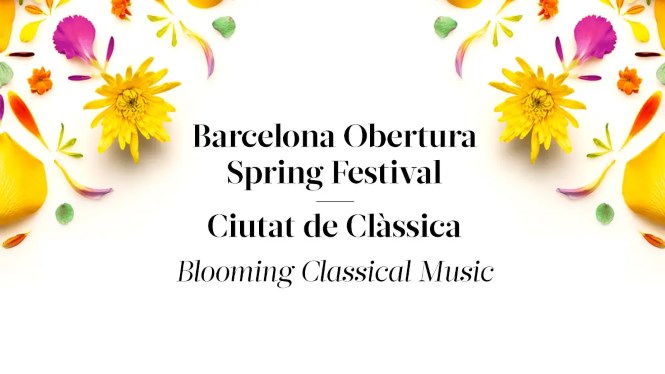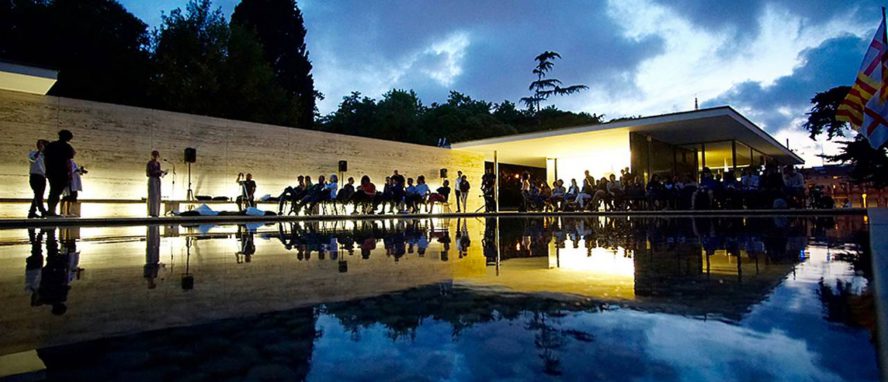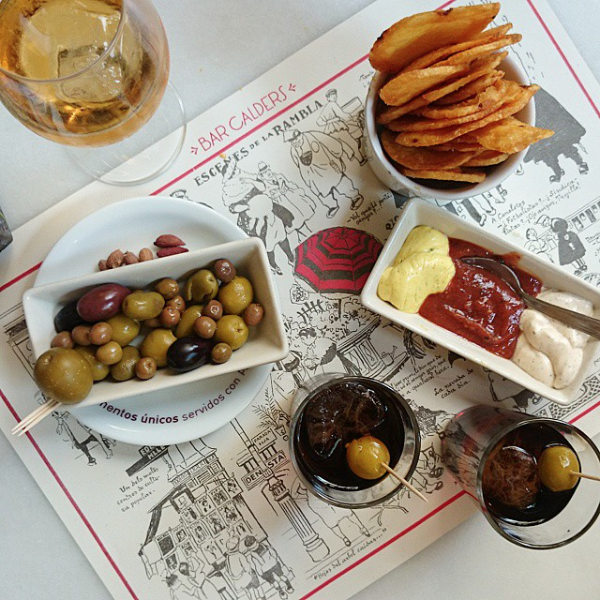Every year, the Ciutat de Clàssica Festival defines a series of themes and artistic lines giving structure, meaning and cohesion to the free concerts on offer throughout the city of Barcelona.
The selected themes can cover a wide spectrum of topics and influences, paying tribute to iconic composers, exploring both their most famous works and lesser-known pieces. On other occasions, the focus is on unusual repertoires, allowing the audience to immerse themselves in rarely performed pieces.
Throughout the most recent editions, the festival has established its programme: the ‘Made in Barcelona Cycle’ as a fundamental element addressing musical and cultural milestones that occurred in the city of Barcelona. This establishes a dialogue between music and local history and highlights the city’s role as a creative epicentre and inspiration for composers and artists over many centuries.
Anniversaries of Luciano Berio, Maurice Ravel & Erik Satie
2025 invites us to celebrate three of the most influential composers of the 20th century, figures who, in their own way, revolutionised the world of music with their creative audacity, sonic imagination and completely novel approach to composition.
Luciano Berio celebrates his 100th birthday, an occasion to remember this pioneer of electronic music and one of the key names of the avant-garde music. His work, characterised by profound sonic experimentation, was a point of inflection for contemporary composition. Berio not only explored new techniques and sounds, but also fused traditional and electronic music, creating pieces that were simultaneously complex and deeply emotional. His innovation both in orchestration and in the exploration of timbre and texture, left an indelible mark that remains as a reference for today’s composers.
2025 sees the celebration of 150 years since the birth of Maurice Ravel. A master of orchestration and a pioneer in the exploration of new sonorities, his ability to create complex and detailed soundscapes places him among the great innovators of the 20th century. Pieces such as Boléro, La Valse or Daphnis et Chloé, meant Ravel forever changed the way we conceive the orchestra and the piano. His meticulous use of orchestral colours allowed this virtuoso of sonority to take music into unexpected territory. His work restructured and revised the musical and pianistic language and his great subtlety and technical perfection remains a key reference for musicians and composers alike.
2025 also marks the 100th anniversary of the death of Erik Satie. Another of the great figure, an eccentric and provocative composer, Satie is considered one of the precursors of minimalism and a pioneer of musical impressionism. Satie’s very peculiar style broke with the musical convention of his time, creating works that were at first glance simple but in reality, profoundly innovative. His influence on the development of modern music is unquestionable, not only for his piano pieces such as Gymnopédies or Gnossiennes, but also for his ability to propose a completely new conception of sound, stripping away baroque complexity and taking music to a more introspective and essential space. Through his music, Satie invited listeners to listen with renewed attention, challenging established structures and an aesthetic that remains a source of inspiration today.
This cycle’s concerts:
- Quinteto de Viento del Gran Teatre del Liceu at Fabra i Coats
- Michèle Bréant & Lucas Huber Sierra at la Casa de l’Aigua de Trinitat Nova
- Llum Colomer at the Joan Miró Foundation
- Bernat Prat & Andrea García at the Pharmacy Faculty University of Barcelona (UB)
6 String Sextets
The string sextet has been appreciated and cultivated by some of the most prominent composers of classical music. Over the centuries, this format has allowed composers to explore the interplay between strings in a more complex and nuanced manner than that of quartets, resulting in works of great sonic-musical richness.
Within this cycle, we present a unique selection of rarely performed sextets, a perfect opportunity to discover some of the hidden gems of chamber music.
Over the course of three concerts, we present six string sextets by outstanding composers Pyotr Ilyich Tchaikovsky, Nikolai Rimsky-Korsakov, Antonín Dvořák, Aleksandr Borodin and lesser-known figures such as Erwin Schulhoff and Frank Bridge. Each of the selected pieces reveals the composers’ ability to explore the sonority and texture of strings, in a broader format of chamber music where the instruments perfectly complement each other.
This cycle’s concerts:
- Sextet de corda (I) at Centre Cívic Zona Nord
- Sextet de corda (II) at Mirador torre Glòries
- Sextet de corda de l’OBC at Centre Cívic Matas i Ramis
Made in Barcelona: Da Camera
The Associació Musical da Camera, founded in 1913, represents the best of Barcelona’s philharmonic tradition, both public and private. The association’s programmes, being innovative, demanding and varied, led composers of the calibre of Ravel, Schönberg and Prokofiev to become deeply involved in the musical life of the city.
The Associació Musical da Camera organised concert seasons at the Palau de la Música Catalana with the best performers of the time, Fritz Kreisler, Pau Casals, Artur Rubinstein and Elisabeth Schumann among many more. The Associació Musical da Camera also supported Catalan musicians and chamber groups until annus horribilis of 1936 when abruptly and tragically closed.
Over six concerts, we invite you to experience the association’s historical programmes.
Concerts in the Da Camera cycle:
- Quartet Vivancos a la Biblioteca García Márquez, interpreting the programme of the concert given 10th January 1921.
- Cecilia Rodríguez & Llum Colomer al Palau Güell, interpreting the programme of the concert given 10th March 1929.
- Trio Ainé del Gran Teatre del Liceu a Casa Batlló, interpreting the programme of the concert given 15th December 1933.
- Emma Campàs al Museu Picasso, interpreting the programme of the concert given 9th Jamuary 1923.
- Patricia Cordero & Karla Martínez a l’Auditori de Sant Martí interpreting the programme of the concert given 23rd May 1925.
Visionaries
Within the corpus of works by all the great composers, there are pieces that stand out not only for their quality, but for their audacity, the ability to go beyond the established. These works represent moments when the composer is driven by a pioneering spirit, challenging the musical conventions of his time to explore new sonorities, forms and approaches. In this concert cycle, we have selected some of these visionary works, less performed today, but which invite us to rediscover the courage and innovation of the composers who created them.
Among them, we find Harmonies poétiques et religieuses by Franz Liszt, a masterpiece that transcends piano virtuosity to become a profound reflection on spirituality and the poetry of sound. Revolutionary in its time, now this piece is rarely performed. This concert is an invaluable opportunity to immerse oneself in the emotional and spiritual complexities of one of the greatest romantic composers.
Frederic Chopin’s Etudes op. 10 are one of the jewels of piano music. Although frequently performed they continue to surprise with the innovation within a seemingly classical structure. Chopin’s etudes are not only technical exercises, but each is a masterpiece that exploring new expressive possibilities on the piano. Chopin transformed the etude into a vehicle for sonic and emotional exploration, elevating the piano repertoire to an unprecedented level of depth and complexity.
The Maris Stella Mass by Tomás Luís de Victoria, one of the most prominent composers of the Spanish Renaissance, is a work that reflects the mastery of sacred polyphony at its finest. Despite its grandeur, this mass is rarely heard in contemporary concerts, so its inclusion is an exceptional occasion. Victoria fuses melodic beauty with a profound spiritual sensitivity, creating a transcendental atmosphere that invites the listener to serene and contemplative reflection.
Concerts within this cycle:
- Qvinta Essençia a la Torre Collserola, interpreting the Maris Stella Mass by Tomás Luís de Victoria.
- Saskia Giorgini at Museu Nacional d’Art de Catalunya, interpreting Harmonies poétiques et religieuse by Liszt.
- Ot Ortega Travé a la Law Faculty University of Barcelona (UB), interpreting Etudes op. 10 by Chopin.
Discover all the concerts in the Ciutat de Clàssica 2025 programme here.
 Book Tickets
Book Tickets



